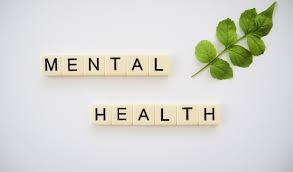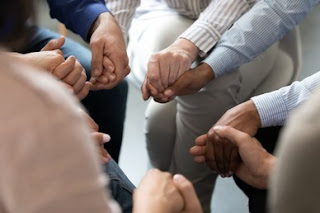☀️Sunny Spells and Scattered Showers🌧️
Feeling well includes feeling like you belong
Connecting with other people and your community doesn’t just feel good, it’s good for your mental health.
Especially after the long periods of increased social
isolation brought on by the pandemic, almost everyone can relate to how this
makes us feel—well, lonely. The good news is that there is a cure for
loneliness, and it can start with even one relationship or social connection.
At its core, belonging is a sense of connectedness, to family,
community, and the world around us. What this looks like in daily life is the
love, kindness and respect we feel from others, and after the past two
years we’ve had, we could all use a little more love, kindness and respect.
We all need to feel like we belong and that others care
about our well-being, and social support is exactly that: the belonging and
care we receive from other people.
Our social support network can include many different groups
of people, including friends, family members, teammates, co-workers, neighbor's or even professionals like your doctor, your mail carrier, or the person you
get coffee from.
When you feel like you belong, you feel like a valued and equal member of the community, and that feels good. Plus, a person is less likely to experience anxiety, depression, or problems with substance use if they have friends and healthy relationships, feel they are a part of a community and can meet their basic day-to-day needs.
That way, if they’re going through a tough time, they also
have a support system to lean on. So, now that you know how important social
inclusion is, how can you go about building your own sense of belonging? Here
are a few tips:
- Focus
on what you have in common – some people have a few strong
personal connections, and some people thrive when they are connected to
larger groups like those on Twitter or their broader cultural or religious
community. It’s normal for people to feel comfortable in groups where they
have something in common, whether it’s a sense of style or career goals.
You may feel like it’s easier to relate to someone who is similar to you,
and this gives you a sense of group membership.
- Express
your needs – be clear with the people in your life about the kind
of help you need, whether it’s someone to talk to or help with a problem.
Tell people what you need—they may be able to offer better help when they
know what you’re looking for.
- Make
a contribution – even if you’ve been hiding away during COVID,
it’s never too late to take care of the important relationships you
already have. To build a connection, you need to contribute to
relationships, too. Offer support to others in your life, whether that’s
chatting with your neighbours or calling an old friend on their birthday.
- Meet
new people – our routines are upside-down right now, so try to
make opportunities to meet new people. Join social activities, take an
in-person or online course, volunteer, or get involved in an organization.
You can also ask friends to introduce you to other people.
- Give it time – give relationships time. It takes a bit of work to build them. You won’t be friends with everyone you meet, and when you do make a new friend, it will take time to strengthen your relationship. Think of belonging as a process, not a one-time event, and you’ll get there
So while emotions are running high at the start of a new year “name it, don’t numb it.” That saying was created by CMHA for Mental Health Week. Mental health week offers a chance to put our feelings front and center.
in the interest of our mental health. That’s because claiming how we feel not only makes sadness, anger and worry less intense, it can also make us feel better. And it can make it easier to manage our emotions, and easier to connect emotionally with others.
There’s brain science behind this too. Research shows that
putting your negative emotions into words disrupts and reduces activity in the
amygdala, the part of the brain that drives responses to stress and fear.
Having a specific label for a feeling increases activity in the prefrontal and
temporal regions of the brain. The act of naming our emotions can actually help
us feel calmer and help us understand what we’re going through.
However, it is important to recognize when difficult
feelings are too much. If intense worry, anxiety, or despair are disrupting
your life or your relationships, or you are relying on substances to cope, it’s
important to seek help.
Next Mental Health Week, people across Canada will get
#GetReal by naming—not numbing—how they feel.
To get involved in Mental Health Week, you can:
- Learn more
about mental health and emotions at mentalhealthweek.ca
- Share your
support on social media by downloading a toolkit and using hashtags
#GetReal and #MentalHealthWeek
- Donate to
support CMHA mental health programs and services at cmha.ca/donate
- Connect. If
you or someone you love is struggling, please contact your
local CMHA or visit the Government of Canada’s Wellness
Together portal. If you are in crisis, please call
1-833-456-4566 toll free in Canada (1-866-277-3553 in Quebec) or dial 911.
Mental Health Week is May 2-8. Visit mentalhealthweek.ca.
#GetReal about how you feel. “Name it, don’t numb it.”
Remember you don’t have to wait for specific events like
Mental Health Week to reach out to others or share how you’re doing. It’s
important to recognize that you aren’t alone and there are resources available
for everyone.
Free Apps:
Whatsup
https://apps.apple.com/us/app/whats-up-a-mental-health-app/id968251160#?platform=iphone
Better help
https://www.betterhelp.com/helpme/?
Online Therapy
https://www.online-therapy.com/?ref=151642












Comments
Post a Comment